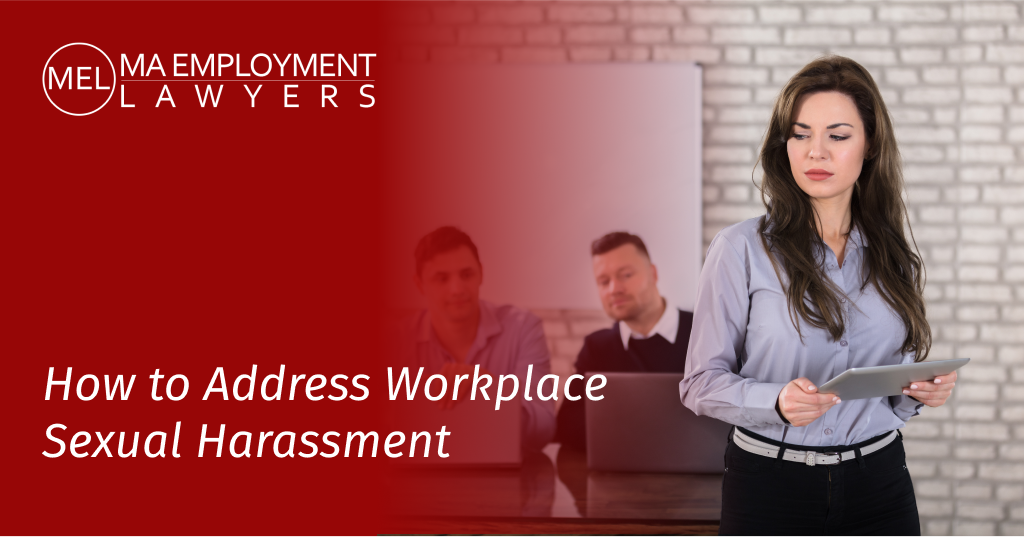How to Address Workplace Sexual Harassment
What Is Sexual Harassment in the Workplace?

Unfortunately, everyone is familiar with the concept of sexual harassment generally. Understanding your legal rights, and what to do when you find yourself in that situation, may not prevent sexual harassment from occurring, but it will prepare you for how to proceed when you are otherwise reeling from such a traumatic event. We at MA Employment Lawyers are highly experienced in navigating and ultimately resolving cases involving gender violence, discrimination, and sexual harassment.
Massachusetts Courts recognize two forms of sexual harassment: quid-pro-quo harassment and behavior that constitutes a hostile work environment. In quid-pro-quo harassment, an employee who is being harassed is offered compensation, a promotion, or the like in exchange for performing or accepting intrusive, unwanted, and unwelcome sexual favors. If an employee does not engage in those favors, in that case, the benefits/offers are taken away and, in some cases, the employee is met with retaliatory behavior as a result of not complying as a participant.
Sexual harassment that takes the form of a hostile work environment, though similar, lives in a separate category. The term “hostile work environment” is often misused (reasonably so) to describe any workplace that is hostile, tense, or otherwise unpleasant. However, when used in the legal context, a hostile work environment refers to a very specific circumstance concerning the improper presence of sex in the workplace. This can include unwelcome touching of a sexual nature, inappropriate comments or jokes about sex, sharing of pornography, and the discussion of people’s sex lives.
In the context of a hostile work environment claim, it is vital to understand that you may have a viable claim under the law even if the sexual behavior is not directed at you. If you are a member of a class of people being inappropriately sexualized and openly observe these actions or behavior directed toward someone in your class, that may constitute a hostile work environment. For example, if you are a woman and your supervisor repeatedly makes lewd comments about the bodies of female customers, your supervisor may be creating a hostile work environment for you – even if you are not the direct target of the comments.
If you are unsure of whether or not you are being subjected to sexual harassment in the workplace, you should call a knowledgeable and seasoned attorney for more information.
Key Points: Workplace Sexual Harassment
-
1
What is sexual harassment in the workplace?
Massachusetts recognizes two forms: quid pro quo (job benefits tied to unwanted sexual conduct) and hostile work environment (unwelcome sexual touching, jokes, comments, pornography, or discussions about sex—even if not aimed at you).
-
2
Employer liability basics
If a manager or supervisor harasses you, the employer can be liable. For co‑worker harassment, liability depends on whether the employer acts promptly and effectively after you report it.
-
3
How to handle sexual harassment in the workplace
Document each incident (dates, times, witnesses, messages), save evidence, and report in writing to the person in your employer’s policy—or to HR/your supervisor if no policy exists.
-
4
What to do if sexually harassed at work
Seek prompt medical care for emotional distress to build records, continue documenting, and consult an experienced employment attorney quickly (deadlines can be short).
-
5
Not just direct targeting
A hostile environment can exist even when conduct isn’t aimed at you—e.g., repeated lewd remarks about a protected group you belong to.
If you’re facing harassment at work, know that help and support are available.
TALK TO USWhen Is My Employer Liable for Sexual Harassment?
Not all instances of sexual harassment in the workplace will result in your employer being found responsible in Court. An employer’s liability is dependent on who is doing the harassing. Upon being notified of any sexual harassment, your employer must enter into a prompt and thorough investigation. If you report sexual harassment by a co-worker who is merely an employee and not a manager or your supervisor, the employer will most likely have one opportunity to try to resolve the issue. Then, it is only if the employer fails to take steps to stop this co-worker’s behavior from happening again, that they can become liable for the sexual harassment. For example, if upon notice, an employer’s corrective intervention is successful in preventing any future sexual harassment, it is unlikely a Court will find your employer liable for any damages caused by the sexual harassment.
However, if the harasser is a manager, supervisor, or someone else that the employer confers authority to the employer is always liable for the sexual harassment. The employer is still required to enter into a prompt and thorough investigation upon being notified of the harassment, but there is no requirement that the harassment occur again for the employer to have liability.
If you have been sexually harassed by a manager, or by a co-worker even after you reported a prior instance of sexual harassment, reach out to a lawyer to understand whether you are entitled to restitution. The statute of limitations for sexual harassment is very short, so do not delay.
What to Do When You’re Being Sexually Harassed at Work?
If you are being sexually harassed, document the harassment as much as possible. Oftentimes, there is no documentation of sexual harassment because the harassment is committed in person, leaving no paper trail. If you find yourself in that situation, it is of the utmost importance that you immediately notify the individual listed in your employer’s handbook under the section that covers sexual harassment of the harassment you endured. If you have not been provided with any sexual harassment policy, contact your immediate supervisor in writing, describing the incident in as much detail as possible. If you are experiencing emotional distress as a result of this experience, it is important that you promptly seek medical attention so that your emotional distress is well and contemporaneously documented. If you decide to pursue a lawsuit, documenting your emotional distress can be as important as documenting the sexual harassment itself.
If you or someone you know has been a victim of sexual harassment in the workplace, our attorneys are available for a free consultation and are available by phone at (508-753-3333) or by email at the following email address: contactforms@cohenkinne.com.
We have recovered millions of dollars for our clients who have experienced sexual harassment in the workplace.




